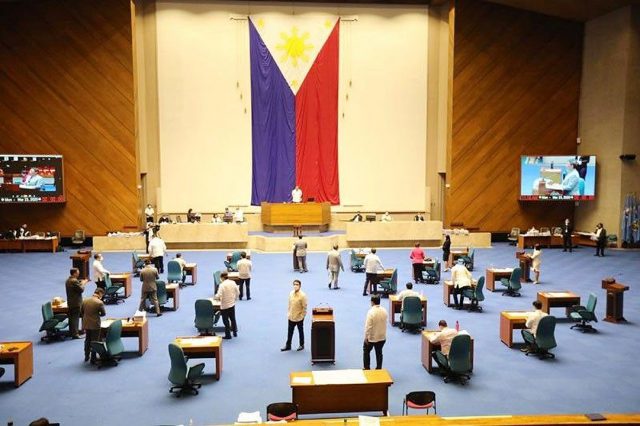NG budget deficit narrows in May
THE NATIONAL Government’s (NG) budget deficit narrowed in May as revenues grew by double digits and spending contracted during the height of the election period, the Bureau of the Treasury (BTr) reported on Thursday.
In a statement, the BTr said the budget gap fell by 26.72% to P146.8 billion in May, from P200.3 billion in the same period last year.
Month on month, the May fiscal balance swung to a deficit from April’s P4.9-billion surplus.
 Total revenues rose by 18.91% to P304.9 billion in May, from P256.4 billion in the same period last year. This was driven by a 21.8% increase in tax revenues to P285.6 billion, but this was offset by a 12.24% drop in nontax revenues to P19.4 billion.
Total revenues rose by 18.91% to P304.9 billion in May, from P256.4 billion in the same period last year. This was driven by a 21.8% increase in tax revenues to P285.6 billion, but this was offset by a 12.24% drop in nontax revenues to P19.4 billion.
Tax revenues were fueled by double-digit growth in collections by the Bureau of Internal Revenue (BIR) and the Bureau of Customs (BoC). BIR collected P216.6 billion, up by 17.91% year on year, while the BoC collected P66.3 billion, up by 36.35%.
The BTr’s revenues dropped by 28.22% to P8.9 billion due to lower dividend remittances, while collections from other offices went up by 8.35% to P10.4 billion.
Security Bank Corp. Chief Economist Robert Dan J. Roces attributed the higher revenues to increased economic activity as restrictions remained at the most lenient level.
“Attribution may be through increased revenue with looser alert levels aiding the economic reopening, allowing the government to garner better tax uptake… There’s also the weaker peso’s factor channeling through import taxes,” he said via e-mail.
The peso closed at P54.70 against the US dollar on Thursday, the lowest since Nov. 21, 2005.
Nicholas Antonio T. Mapa, senior economist at the Manila branch of Dutch bank ING Bank N.V., said Customs collections may have gotten a boost from the more expensive fuel imports.
At the same time, government expenditures contracted by 1.1% year on year to P451.7 billion in May, as an election ban on public works projects was in place until May 8 or a day before the May 9 national elections.
Pantheon Macroeconomics Chief Emerging Asia Economist Miguel Chanco said the contraction in spending was expected as this is usually seen in election months.
“It should serve as a warning shot for the Q2 GDP report, which we think will be tarnished quite significantly by the natural pause in government spending during periods of political transition,” Mr. Chanco said.
Primary expenditures, or spending net of interest payments, slipped by 2.32% to P417.9 billion in May.
Interest payments for May increased by 16.93% to P33.8 billion.
Meanwhile, the year-to-date budget deficit declined by 18.99% to P458.7 billion, as revenue growth outpaced spending.
Total revenues jumped by 15.46% to P1.43 trillion in the first five months of 2022, while expenditures rose by 4.69% to P1.9 trillion.
The bulk of revenues came from tax collections, which grew by 14.15% to P1.28 trillion. BIR collections rose by 9.92% to P959 billion, while BoC collections went up by 28.42% to P320.5 billion.
Nontax revenues, on the other hand, increased by 28.32% to P147.6 billion, thanks to a 37% rise in BTr revenues to P83.4 billion.
“Certainly, the punchy revenue numbers year to date are an encouraging sign of the economy’s recovery, though I’d be wary of overly praising any substantial rise in indirect taxes in the current inflationary environment,” said Mr. Chanco.
Inflation was 5.4% in May, the highest in three and a half years, exceeding the Bangko Sentral ng Pilipinas’ 2-4% target range.
Primary expenditures stood at P1.67 trillion in the five months to May, up 2.64% year on year. Interest payments jumped by 23.43% to P220 billion.
“For the period January-May, interest payments accounted for 15.34% of revenues and 11.63% of expenditures, up from last year’s 14.35% and 9.86%, respectively,” the BTr said.
The government expects the budget deficit to hit P1.65 trillion this year, slightly lower than the actual deficit of P1.67 trillion in 2021.
“Going forward, the incoming administration must continue to push increased revenue collections to bring the deficit within the program of P1.6 trillion for the year,” said Mr. Mapa. “Improved revenue collection will be crucial all the more given [President-elect Marcos’] directive to spend and invigorate the economy.”
As of the first quarter, the budget deficit as a ratio of the gross domestic product (GDP) stood at 6.4%.
The government aims to reduce the deficit to 7.6% of GDP this year, and further to 6.1% in 2023, 5.1% in 2024 and 4.1% in 2025. — Diego Gabriel C. Robles












